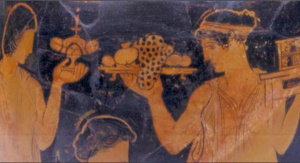Language/Ancient-greek-to-1453/Culture/What-did-the-Ancient-Greeks-eat-and-drink?
Ancient Greece was the home of the warriors, battles and myths which still inspire imaginations today. But what of the everyday lives of the people who lived there; what did the Athenians, Spartans and other residents of Ancient Greece eat and drink? Contrary to what modern nutritionists claim about the benefits
of a rich breakfast, the ancient Greeks started their day with a very simple meal, which included some barley bread, dipped in unsweetened wine,
along with olives and figs.Much of the food that the Ancient Greeks ate was home grown. That which households did not produce themselves would be obtained from the local agora or marketplace.Vegetables have played a leading role in their daily diet, but there was not as much variety as there is today. Fruits such as oranges, tangerines, peaches and bananas may not have existed, but pears, pomegranates, apples, figs, berries, cherries and plums were in great demand. They had a special love for lettuce, cucumbers, peas, artichokes, celery, dill and mint. Mushrooms, fennel, asparagus, and even tender nettles were sought after in rivers and fields. Birds, salted fish and seafood such as octopus, squid, anchovies, oysters and eels were luxury items. The poor would eat meat only at public festivals held in honour of the Olympian deities, when hundreds of animals were slaughtered. Fortunately for them, these occurred fairly frequently throughout the calendar. There were no fast food outlets or restaurants, but if you felt peckish mid-morning, you could always grab the equivalent of a souvlaki from a street vendor. This consisted of bits of vegetables and scraps of meat on a skewer, as it does today. They also had a great love for bread, since they used to make several types, including laganas, semolina bread, bread from coarse flour and millet bread.
15 different types of bread, from baguettes to whole wheat and traditional pies in filling : cheese pie, onion pie, meat pie, mushroom pie ..
After mastering this lesson, these related pages might interest you: Timeline of ancient Greece, Gamos – Marriage, Pindar Poem & Ancient Greece Timeline.
Like us, the Greeks ate three (sometimes four) meals a day[edit | edit source]
• Akratismos : breakfast (This means pure wine, wine not mixed with water (άκρατος οίνος) to soften dry bread, accompanied by figs and olives.
The breakfast of the Greeks was a fugitive)
• Ariston : lunch (the second part of this meal takes place at noon or the afternoon).
• Hesperisma : to taste it, not systematic
• Deipnon : dinner, which sometimes ended with a small dessert
• Symposium : the banquet, for special occasions. Only freeborn men and hired women, known as hetairai, could participate at a symposium. Wives, daughters, sisters, mothers, grandmothers, aunts, nieces and even girlfriends weren’t welcome. Men didn’t drink with their buddies every evening, however. On one or two evenings a week they probably graced family members with their presence. The tone of a symposium depended on the temperament of the drinkers. The participants in Plato’s dialogue "The Symposium" each give a speech about love. But this kind of sedate and philosophical affair would have been the exception rather than the rule. Some of the scenes which adorn drinking vessels are highly erotic.
Food for the sick[edit | edit source]
The most famous and important exponent of Greek medicine, Hippocrates believed that nature was the healer,
fever was considered the body’s defence (something we have proved today) and the physician may try and restore health in the patient through diet.
Kykeon, the lost wine[edit | edit source]
Kykeon is most famous, however, for its use in the Rites of Demeter at the city of Eleusis where it was used by initiates to experience the mystery of death and rebirth in the ritual which came to be known as The Eleusinian Mysteries. This mixture, however, differed significantly from the common drink in that it had psychoactive properties, most likely caused by the fungus Ergot on the barley gathered around Eleusis, which allowed initiates in the Mysteries to reach a fuller understanding of their purpose in life and to shed their fear of death; as testimonials from ancient writers who participated in the Mysteries attest.
The Greeks were also familiar with mead (alcohol made from honey) which spread throughout Europe. But the Greeks used mead as a refreshing medicinal drink.
https://www.worldhistory.org/Kykeon/
https://www.neo-nutrition.net/que-mangeaient-les-grecs-anciens/
Author[edit | edit source]
- Ευγενική χορηγία που στοχεύει να βοηθήσει μαθητές ή μη, απανταχού της Γης, που επιδίδονται στην εκμάθηση της ελληνικής γλώσσας!
- Contribution bénévole visant à aider les personnes, partout dans le monde, qui sont engagées dans l'apprentissage de la langue grecque !
- Voluntary contribution aimed at helping people, all over the world, who are committed to learning the Greek language!
Other Lessons[edit | edit source]
- Gamos – Marriage
- Ancient Greek Houses
- Pindar Poem
- Thespis the father of dramatic art
- Amphidromia Ceremony birth of a child
- Greek Philosopher quotes
- The Ancient Greek Calendar
- Historical personalities
- Miasma : Religious Pollution in Greek antiquity
- Timeline of ancient Greece
- Ancient Greek first names for tattoos
- Ancient Greece Timeline
- Ancient Greek funeral and burial practices
- The Ancient Greek Afterlife

